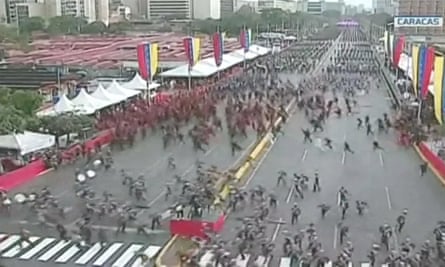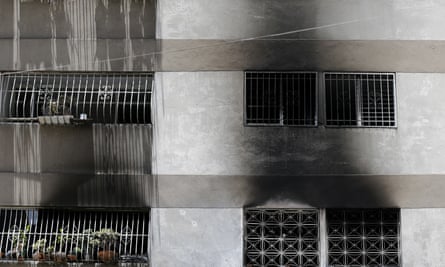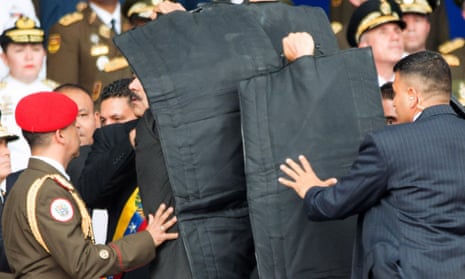Venezuela’s opposition has warned that President Nicolás Maduro may launch a political crackdown after he accused adversaries of attempting to assassinate him with drones loaded with explosives on Saturday.
State television on Saturday evening showed Maduro and his wife, Cilia Flores, looking up at the sky and wincing after hearing the sound of an explosion midway through a speech he was giving at a military parade in Caracas. Seconds later, the footage panned to hundreds of soldiers chaotically scurrying out of formation and running away before the television feed was cut.

Seven people were injured, the country’s information minister, Jorge Rodríguez, said. “The investigation clearly reveals [the explosions] came from drone-like devices that carried explosives,” he told reporters.
Authorities have said that six people have been arrested over the incident.
On Sunday Venezuela’s defence minister claimed those behind the alleged attack were aiming to decapitate the government’s entire top leadership along with Maduro.
Of the six arrested, interior minister Nestor Reverol said two had previously been detained in street protests. Venezuela has been periodically rocked by demonstrations over shortages of food and medical supplies that officials claim incite violence.
Although witnesses confirmed seeing at least one drone that appeared to be linked to an explosion, exactly what happened still remained unclear on Sunday.
The Frente Amplio, or Broad Front, opposition coalition issued a statement accusing the government of leaping to the assumption the explosions were an assassination attempt and of making “irresponsible” accusations without any proof.
“We warn that the government is taking advantage of this incident … to criminalise those who legitimately and democratically oppose it and deepen the repression and systematic human rights violations,” the coalition said in a statement on Sunday.
Speaking from the presidential palace two hours after the apparent attack, Maduro was in no doubt about what had happened, announcing that those behind the attempt on his life had been captured. He suggested that an initial investigation showed Colombia and the US state of Florida, where many Venezuelan exiles live, were linked to the explosions.
“I am alive and victorious,” the socialist president said in a bellicose televised address. “Everything points to the Venezuelan ultra-right in alliance with the Colombian ultra-right, and that the name of Juan Manuel Santos is behind this attack.”
A spokesperson for the Colombian president, who leaves office on Tuesday, quickly denied the allegations. “The president is focused on the baptism of his granddaughter and not on bringing down foreign governments,” the official said.
The two presidents have often sparred, with Santos regularly labelling his Venezuelan counterpart a dictator and saying he is leading his country into economic and political turmoil.
No one has claimed responsibility for the alleged assassination attempt, though one group, Franelas Soldiers, suggested involvement in a tweet. “We have shown [the government] is vulnerable,” the group, the identities of whose members are not known, said. “[The attack] wasn’t achieved today but it is just a matter of time [until it is].”
Piedro Peña, who lives on the seventh floor of the Residencias Don Eduardo apartment block, just two blocks from the Avenida Bolívar, the central highway where the parade was taking place, told the Guardian he had seen a drone crash into the building and then explode. “I saw a black flying device with lights about four metres from me, it was a drone. I waved my hand, like saying hi, because I thought it was a toy,” he said. “Then the drone started falling and hit the building – towards the first floor – and exploded and the smoke started coming to the upper floors.”

A witness interviewed by the Associated Press showed a mobile phone video of a drone hovering over a residential street two blocks away and then crashing into a building. While the video does not show an explosion, the witness said it fell and then exploded, starting a fire in the building.
An earlier account by firefighters at the scene of the blast had linked the explosion to a gas leak.
Another witness, who asked not to be named, tried to film the chaos on his phone from outside the event’s picket barrier. “I started recording with my phone what was happening around me … people running around … and a member of the national guard approached me, took my phone and deleted the video,” the man said.
Rocío San Miguel, a military expert and the head of Control Ciudadano, an investigative website focused on security, said that at least one drone belonged to the military, who lost control of the device inflight. Soldiers then shot it down.
“So far the drone attack is the best explanation we have, but it raises far more questions than answers,” said Geoff Ramsey, the assistant director for Venezuela at the Washington Office on Latin America.
Quick GuideWhy is Venezuela in crisis?
Show
Under the late Hugo Chávez, who ushered in Venezuela’s socialist revolution in 1999, a new constitution and numerous elections placed nearly all government institutions under the control of the ruling Socialist party.
This concentration of power was aided by a feuding opposition which carried out ineffectual campaigns and electoral boycotts. After Chávez died of cancer in 2013, he was succeeded by Nicolás Maduro who is even less tolerant of dissent.
Growing political authoritarianism has coincided with greater state dominance over the economy. But expropriations, price controls and mismanagement have led to a 40% contraction of the economy in the past five years.
Oil accounts for 96% of Venezuela’s export income but many foreign companies have been driven out and production has dropped to a 30-year low.
The resulting fiscal crisis has prompted the government to print more money, which has led to hyperinflation and a collapse of the currency.
It also means that the government can’t import enough food and medicine to meet demand.
Maduro has rejected economic reforms out of loyalty to socialism and because many government officials are allegedly getting rich off the economic distortions – through exchange rate scams and by selling scarce food on the black market.
Ramsey dismissed the notion that the attack was a “false flag” operation. “Staged or not, the end result will be the same. Maduro is certain to use this to justify further repression of the opposition, and to rally his ruling circle around a perceived enemy threat,” he said.
Venezuela, which has the largest proven oil reserves on the planet, has been in economic and political turmoil for several years, triggered by low oil prices. The International Monetary Fund predicts inflation will reach 1m% by the end of the year, and shortages in basic goods and medicines are widespread.
Maduro replaced the socialist Hugo Chávez after his death from cancer in 2013. The former bus driver has moved to stamp out dissent, with recent anti-government demonstrations leaving more than 100 people dead. In July last year, he sidelined the opposition-led Congress and installed a new body stacked with loyalists.
He won a new six-year term in May but his main rivals disavowed the election and alleged huge irregularities.
A rogue police officer, Óscar Pérez, hijacked a helicopter last year and fired at government buildings in what he said was an action against a dictator. Pérez was hunted down and killed by Venezuelan forces.
